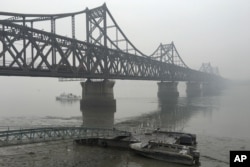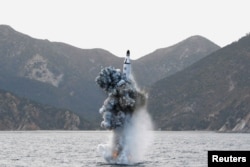After North Korea's largest-ever test of a nuclear device in early September, the United States is taking an unprecedented hardline stance to curb the reclusive regime's accelerated pursuit of nuclear development.
The U.S. Treasury announced last week that it had sanctioned China's Dandong Hongxiang Industrial Development and four of its executives. The Treasury accused the firm of laundering millions of dollars via U.S. banks for North Korea's Kwangson Banking Corporation, which has already been blacklisted by the U.S. and United Nations for its involvement in the North's nuclear and missile development.
Daniel Fried, coordinator for sanctions policy at the U.S. State Department, indicated at a recent Congressional hearing that more Chinese companies could be under U.S. investigation for suspected breach of North Korean sanctions.
Crackdown on Chinese firm
"We have crossed a line here," said Bradley Babson, former World Bank adviser and chair of the DPRK Economic Forum at the U.S.-Korea Institute at the Johns Hopkins School of Advanced International Studies.
"We are now doing things that we have never done before in trying to chase down the way North Korea tries to evade sanctions," Babson said.
Gordon Chang, an author and columnist who writes extensively on China, said there has been growing frustration within the U.S. government over illicit trade between China and its ally.
"We've been much too tolerant, but nonetheless we are going to see a change in attitude on the part of the administration, which is already starting to manifest itself," Chang said.
Babson said the sanctions are likely to limit Chinese companies — both sanctioned and unsanctioned — from engaging in business activities with North Korean entities.
"Sanctioning means they won't be able to work through the American banking system for their business interests, and I think it would make the business community in China very wary about doing business with North Korea," he said.
Diplomatic pressure
Washington is also stepping up diplomacy to further isolate Pyongyang from the international community. Last week, Daniel Russel, the U.S. assistant secretary of state for East Asian and Pacific Affairs, told a Congressional hearing that the U.S. mobilized its embassies around the world to ask host governments to take further additional actions to "downgrade or sever diplomatic and economic ties" with the North.
Critics are warning that the U.S. move to use domestic law to crack down on a Chinese firm could trigger a diplomatic backlash from Beijing. In response to the U.S designations, Beijing criticized Washington for carrying out what it called "long arm jurisdiction."
Chang said the U.S. is not likely to relent in the crackdown despite the Chinese opposition.
"Eventually, the U.S. sanction will have an effect largely because as China stalls, the United States is going to take more and more coercive measures," the China expert said.
The U.S. is also accelerating a plan to deploy its advanced anti-missile defense system in South Korea. The deployment plan has sparked public fear about potential health risks and drawn protests from neighboring China. Despite the controversy, Washington and Seoul are moving forward with the deployment.
This report was produced in collaboration with VOA Korean Service.













